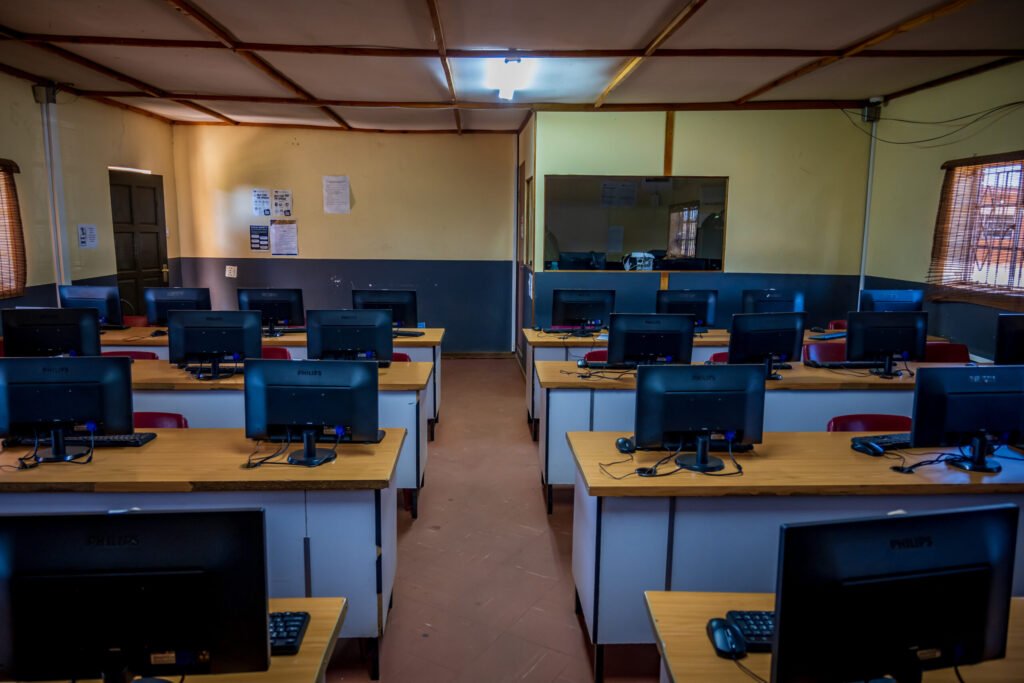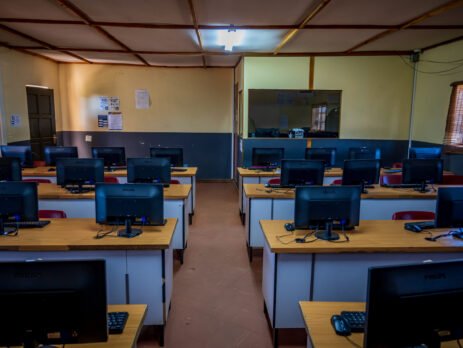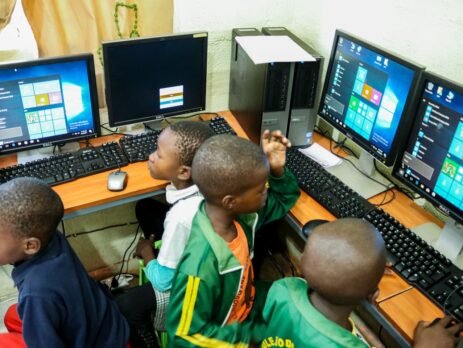DTI Labs
The DTI Center has launched a pilot program that includes four DTI labs located in the Rwamagana District of Eastern Province, Rwanda. This initiative aims to provide IT facilities closer to the homes of vulnerable children and young adults. It specifically targets individuals from under-resourced communities, offering them essential Information Technology (IT) knowledge and practical digital skills.
The DTI Labs provide IT training on weekends and during school holidays, allowing beneficiaries to develop critical digital skills without interfering with their regular school commitments. On weekdays, the center offers IT training for youth who are not enrolled in formal education. These participants attend two-hour training sessions each day, helping them balance their daily activities.
Additionally, the DTI Labs feature Online Business Hubs in rural areas, which aim to empower young people through digital inclusion, entrepreneurship, and sustainable economic development. These hubs serve as accessible centers equipped with reliable internet connectivity, digital tools, and business support services, enabling rural youth to engage meaningfully in the digital economy.
The DTI Labs emphasize digital inclusion in rural areas, ensuring that vulnerable girls, individuals with disabilities, and those with limited literacy have equal access to digital technologies, essential skills, and opportunities. Through this initiative, we are committed to promoting inclusive growth and providing equal opportunities for everyone.

Suggested Programs & Course Levels
Digital Literacy & Basics Program (Level 1)
DTICenter2025-08-01T11:35:08+00:00Duration: 2–3 months
Objective: Familiarize children with computers and basic operations.
Modules:
- Introduction to Computers: Hardware & Software
- Operating Systems (Windows/Linux basics)
- Typing & Keyboard Skills
- Using a Mouse & File Management
- Introduction to the Internet & Web Browsing
- Introduction to MS Office (Word, Excel, PowerPoint)
- Basic Online Safety
Intermediate IT Training (Level 2)
DTICenter2025-08-01T11:34:16+00:00Duration: 3–6 months
Objective: Teach logical thinking through coding in a fun way.
Modules:
- Introduction to Programming with Scratch
- Basic Python Programming
- Logic Building and Problem Solving
- Creating Simple Games (e-sport / Gaming apps)
- Mobile Apps
- Digital Drawing
- Photo Editing
- Video Making
- Storytelling through Animation
- Podcast & Audio Editing
Advanced IT training (Level 3)
DTICenter2025-08-01T11:36:27+00:00Duration: 6–12 months
Objective: This optional specialization course allows learners to focus on specific IT fields.
Modules:
- Coding
- Graphic Design
- Python / AI
- Web Development
- Mobile Application Development
- Networking
- Data science Cyber
- Security
- Robotics
- Game Design
DTI Center Training Schedule
Digital Literacy & Basics Program (Level 1)
DTICenter2025-08-01T11:51:54+00:00The beginner's schedule is designed for training over 2-3 months, with options available during school
holidays and weekends. Attendance is mandatory for all registered participants.
Intermediate IT Training Program (Level 2)
DTICenter2025-08-01T11:53:09+00:00The Intermediate IT Training Program is designed to enhance the technical skills and operational efficiency
of participants over a duration of 3 to 6 months. This program is suitable for those who have already
completed basic IT training or have foundational knowledge in the field.
Sessions will be conducted by experienced IT professionals and will include a combination of theoretical
instruction and hands-on practical exercises. Attendance is mandatory for all registered participants.
Advanced IT training (Level 3)
DTICenter2025-08-01T11:53:49+00:00The course schedule is flexible and modular, spanning 6 to 12 months. This optional course of
specialization allows learners to specialize in specific IT fields that align with their career goals or
organizational needs. This specialized training is ideal for IT professionals looking to advance their careers,
develop niche skills, and invest in workforce development. Upon completion, learners will be well-
prepared to take on specialized roles in the IT sector or pursue additional certifications and professional
recognition. Attendance is mandatory for all registered participants.
Training Format
Session Duration:
• 2–3 hours/day, 2 days/week (weekend program)
• 2–3 hours/day, 5 days/week (school holidays program)
• Delivery (leaners): In-person attendance (Mandatory)
• Delivery (Instructors): In-person or online (Zoom/Classroom platforms)
Our Approach to IT Training for Children and Young Adults
The DTI Center approach emphasizes engagement, creativity, and practical learning, tailored to meet the developmental stages and interests of both children and young adults. We offer a structured yet flexible curriculum that combines foundational knowledge with hands-on experience, ranging from basic computer literacy to advanced IT skills.
Our classes are led by experienced instructors who are passionate about teaching and skilled in working with young learners. We foster a student-centered learning environment that encourages exploration, collaboration, and real-world applications. Each student has opportunities to work on projects that reflect their personal interests, ensuring a meaningful and lasting learning experience.
Above all, our goal is to bridge the digital divide, promoting inclusivity and access for individuals from all
backgrounds.
Beneficiaries and Enrollment Procedure
We are dedicated to empowering rural communities through accessible and inclusive IT education. To ensure a fair and efficient enrollment process, we have established the following procedure:
1. Eligibility Criteria
• Age Group: 8 to 30 years;
• Residency: Must be a resident of a recognized rural area;
• Literacy: Basic literacy (reading and writing) in the local language;
• Interest: Strong interest in learning computer and digital skills.
2. Application Process
• Step 1: Registration
Interested applicants can collect a registration form from the local training center or download it from our
website.
• Step 2: Submission
Completed forms must be submitted along with a copy of a valid ID (e.g., school ID, birth certificate, or
village ID) and a recent photograph.
• Step 3: Verification
Our local coordinators will verify the submitted information and conduct a brief interview or orientation
to assess the candidate's motivation and readiness.
3. Selection and Notification
• Selection will be based on eligibility, level of interest, and available training slots.
• Priority will be given to girls, persons with disabilities, and economically disadvantaged applicants.
• Selected candidates will receive official confirmation via phone call, SMS, or community notice board.
4. Orientation and Commencement
• An introductory session will be held before training begins to familiarize students with the curriculum,
instructors, and training environment.
• Training sessions will take place at local centers equipped with computers and internet access.
5. Support and Follow-Up
• Participants will receive learning materials and ongoing mentorship.
• Upon completion, certificates will be awarded, and outstanding performers may be offered internships
or advanced training opportunities.
• Help learners achieve sustainable livelihoods and to empower them to become job creators in their
communities.


